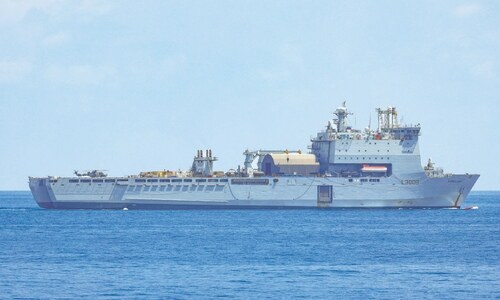WASHINGTON: One of the men ultimately responsible for the diplomatic and military showdown taking place right now in the South China Sea is an English lawyer, famed for a massive treatise he wrote by hand in Latin and mysteriously acquiring a now-famous Chinese nautical map. Though he’s been dead for 360 years, the legal arguments that John Selden laid out to justify countries snatching up oceans as if they were swaths of land are very much alive and kicking.
And that’s a very big deal, because China’s apparent embrace of Selden’s ideas is leading to a head-on collision between America’s belief that the world’s waterways should be open to all and China’s insistence that it can take exclusive control of portions of them. That is to say, what’s at stake in the fight over China’s dispatch of an oil rig to waters off the coast of Vietnam is not a few barrels of oil but rather whether the global system that has driven the rise of the West lives or dies.
“Chinese behaviour calls into question the core principle of the freedom of navigation to favour a conservative, continental approach to the sea,” said Alessio Patalano, a specialist on East Asian maritime issues at King’s College London.
So what’s all this have to do with the long-dead English lawyer? It goes back to a sordid legal duel between the English and Dutch in the early 1600s. The Dutch were the pre-eminent global trading and naval power of the day; the English were not. And nobody was more threatened by the Dutch rise than the English — in 1667, the Dutch would sail up the Thames River and burn the whole fleet.
Wanting to make sure that the world’s oceans were kept open for business, the Dutch jurist Hugo Grotius wrote The Open Sea in 1609. He argued that no one nation can own the high seas, because they are the common inheritance of all mankind. “Every nation is free to travel to every other nation, and to trade with it,” he insisted. It was a blatantly self-interested legal argument for a trading power stuck in a tiny bit of land off the North Sea, but it packed a legal punch.
England sought a legal answer to Grotius, and by 1635 it had one when John Selden finally published a direct rejoinder: The Closed Sea. Selden argued that waters off the coast of a kingdom, such as the waters that the Dutch and English were supposed to share, could in fact be claimed as national territory. “The Sea, by the Law of Nature or Nations, is not common to all men, but capable of private Dominion or proprietie as well as the Land,” he wrote.
King Charles I loved the idea, because it gave him a way to push back at the Dutch and expand royal power and reach at a time when parliament was getting uppity (it would behead him just a few years later). “The King of Great Britain is Lord of the Sea flowing about, as an inseparable and perpetual Appendant of the British Empire,” Selden wrote.
It wasn’t an entirely novel idea: older empires including Rome, Spain, and Portugal had also tried to fence off bits of the sea to keep out military and commercial rivals. But Selden’s treatise stood for centuries as the ultimate attempt to rebut Grotius, whose ideas essentially form the basis for modern international law and the law of the sea.
Ironically, the British themselves abandoned Selden’s notions in favour of Grotius’s as soon as the Dutch took over the British crown in the Glorious Revolution. After that, Britain was as interested in anybody as promoting free and open seas underpinned by the unhindered passage of traders and war ships. And they did so for a few centuries, before grudgingly passing the baton to the US in the early 20th century.
This all matters today, because like a zombie Selden’s ideas are clawing their way out of the grave thanks to China. Its appropriation of many of the same legal arguments that Selden made for King Charles to wield against the Dutch are now being turned against Beijing’s neighbours in the western Pacific — and against the US.
Chinese leaders increasingly speak of “territorial integrity” when talking about the South China Sea, which they pretty much claim in its entirety with the “nine-dashed-line”, a vague map that seems to label most of that sea as Chinese territory. For years, Chinese scholars have pushed the notion of “blue territory”, or offshore islets and surrounding waters that should be as much a physical part of China as what’s behind the Great Wall. Last week, China’s top general said as much at the Pentagon.
“I want to underscore, finally, that for the territory, which has passed down by our ancestors into the hands of our generation, we cannot afford to lose an inch,” Gen Fang Fenghui said of the disputes in the South China and East China seas. His US counterpart, Gen Martin Dempsey, the chairman of the Joint Chiefs of Staff, said the US move to the Pacific is designed to protect freedom of navigation and trade.
Beijing’s interest in trying to turn its near seas into Chinese territory is, at root, all about security.
Peter Dutton, the director of the China Maritime Studies Institute at the US Naval War College, told Congress earlier this year, “The Chinese have long felt vulnerable from the sea, and their current maritime strategy seeks to reduce that vulnerability by extending a ring of maritime control around China’s periphery.”
And that explains the mounting unease in Washington, which for decades has sent warships into waters claimed by friends and foes alike to assert the international right to freedom of navigation, which is the linchpin of America’s ability to be a global superpower.
“What the Chinese are doing here is effectively going after a core, stated, US national interest,” said Gabriel Collins, a security analyst and an expert on Chinese maritime issues.
—By arrangement with Foreign Policy-The Washington Post
Published in Dawn, May 20th, 2014
















































Dear visitor, the comments section is undergoing an overhaul and will return soon.